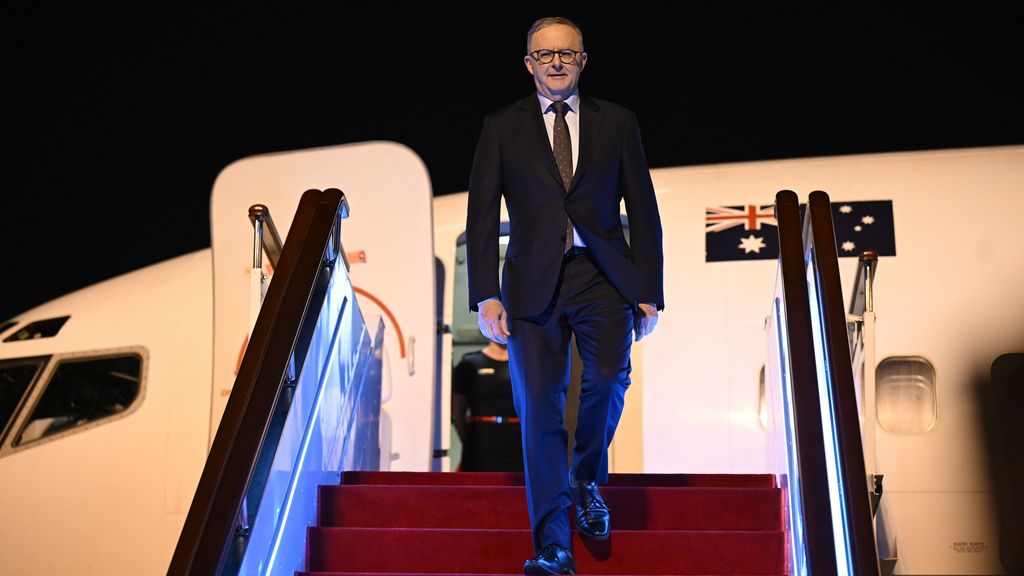Noos News•
-

Mike Wiggers
Australia correspondent
-

Mike Wiggers
Australia correspondent
Australian Prime Minister Anthony Albanese arrived in China for a three-day visit. Tomorrow, he will visit a major trade fair in Shanghai, which will be opened by Chinese Premier Li Qiang. Monday The long-awaited meeting with Chinese leader Xi Jinping is scheduled to take place.
This is the first time in seven years that an Australian Prime Minister has visited China. For a long time, the relationship between Beijing and Canberra was so poor that there was almost no communication at all. The dispute began in 2018, when Chinese telecommunications company Huawei was excluded from building Australia’s 5G network.
The fire was already lit when Australia was the first country in 2020 to call for an investigation into the origins of the coronavirus. China was angry at this and retaliated.
High tariffs on imports
This retaliation included imposing extremely high tariffs on a range of Australian products, from beef and barley to lobster and wine. Chinese importers were suddenly forced to pay an import tariff of more than 200 per cent on Australian wine. This means the end of the hitherto highly profitable trade.
Mark Davidson of Tamburlaine Organic Wines, an organic vineyard in the Hunter Valley region north of Sydney, is among the vintners affected. He has invested a lot in his relationships with Chinese customers. “It was a huge growth market. More than 1.3 billion people all wanted to party,” he says. “Due to import tariffs, trade came to an abrupt halt.”
‘Sanctions failed’
Although many Australian industries have been affected by economic sanctions, not all trade has stopped. China continued to purchase raw materials such as iron ore and natural gas. Therefore, the consequences for the Australian economy were manageable, says Hervé Lemahieu of Australia’s Lowy Research Institute.
He says: “The sanctions have failed and have not achieved the desired effect politically.” China had hoped to drive a wedge between Australia and the United States, but that bond has become stronger. “Australia is the canary in the coal mine. An example of how Western countries can deal with a more assertive and aggressive China.”
Journalists arrested
During the lows of China-Australia relations in 2020, Chinese-Australian journalist Cheng Lei was also arrested. She was accused of leaking state secrets. Two Australian journalists were also forced to leave the country in a hurry after threats from the Chinese state.
Cheng, 48, told the newspaper that she spent more than three years in a cell where she was monitored 24 hours a day by two guards who sat next to and in front of her and she was not allowed to speak to them. Australian PBS 7.30. She was suddenly released recently, not coincidentally just before Albanese’s visit to China.
Prime Minister Albanese is under pressure to demand the release of Australian-Chinese writer Yang Hengjun during his visit. He has been detained since 2019 on espionage charges. The Australian media also wants him to insist Australian journalists can do their work in China again.
American ally
Most import tariffs have now been eliminated. Winegrowers still have to be patient, but trade is expected to start up again next year. China wants something in return. The country wants to join the region’s main free trade agreement, the Comprehensive and Progressive Agreement for Trans-Pacific Partnership (CPTPP).
“This will strengthen China’s position as the dominant economic power in the region,” says LeMahieu. This requires Australia’s support.
But the United States remains Australia’s most important ally, both strategically and ideologically. Therefore, Albanians are unlikely to agree to this Chinese request. “Albanese has just returned from Washington, where he made it clear that Americans would feel uncomfortable here.”
Balancing act
LeMahieu says the visit therefore represents a balancing act for the Australian Prime Minister. “Albany has tried to temper expectations. He sees this as an opportunity to find a way to peaceful coexistence, nothing more.”
The meeting can’t come too soon for the Australian wine industry. There is a national surplus of wine, and there is enough in stock 859 Olympic swimming pool To fill. This concerns more than two billion liters of wine, or more than 2.8 billion bottles. According to Davidson, Australian winegrowers are at a start-up stage. “we are ready.”







